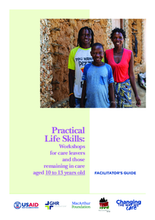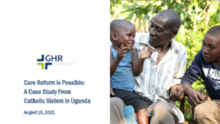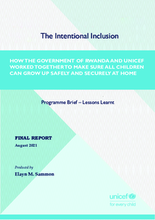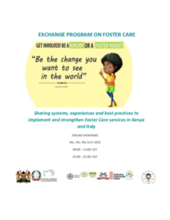Displaying 301 - 310 of 1622
This series of resources are designed by care leavers for care leavers to help equip youth for life outside of care, strengthen coping strategies, foster safety nets and community networks. This Facilitator's Guide is based on the 10 to 13 guidebook and 18 to 25 guidebook.
This series of resources are designed by care leavers for care leavers to help equip youth for life outside of care, strengthen coping strategies, foster safety nets and community networks. It builds from earlier life skills work that the Kenyan Society of Care Leavers has done, supported by Changing the Way We Care with global best practices.
UNICEF is advertising this individual consultancy for the purpose of putting in place technical guidance note and policy directive in support as well as develop a range of child and family package that will support the family based care of children with disabilities.
This presentation details the landscape of Catholic landscape of care in Uganda and shares details of a case study from the Catholic Sisters in Uganda.
UNICEF is seeking a consultant to provide Technical Assistance to the Kenyan State Department of Social Protection in the Ministry of Labour and Social Protection on the implementation of the care reform strategy.
This present report describes the childcare reform process in Rwanda during 2020 and 2021, against the background of the overall reform initiated since 2012
These presentations from UNICEF and Alternative Care Thailand were delivered during the July 9, 2021, workshop of the Care Measurement Task Force of the Transforming Children's Care Global Collaborative Platform. The focus of the workshop was on care measurement initiatives in Eastern and Southern Africa and Thailand.
The Kenya-Italy “Virtual Exchange Program on Foster Care” aims to create a platform for learning, networking and sharing knowledge and best practices on Foster Care among different government stakeholders, from Kenya and Italy.
The exchange program took place on 5th, 7th and 9th July 2021.
This free conference will share Railway Children Africa's experience in gaining the trust of street connected children, and working to address the root causes of children running away to the streets.
Join this online event to learn what kinship care looks like in different contexts and why recognising it is so important.





